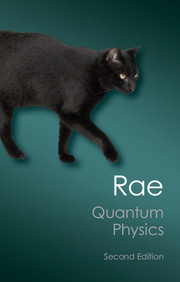Book contents
- Frontmatter
- Dedication
- Contents
- Preface to the first edition
- Preface to the second edition
- 1 Quantum physics
- 2 Which way are the photons pointing?
- 3 What can be hidden in a pair of photons?
- 4 Wonderful Copenhagen?
- 5 Is it all in the mind?
- 6 Many worlds
- 7 Is it a matter of size?
- 8 Backwards and forwards
- 9 Only one way forward?
- 10 Can we be consistent?
- 11 Illusion or reality?
- Further reading
- Index
9 - Only one way forward?
Published online by Cambridge University Press: 05 February 2014
- Frontmatter
- Dedication
- Contents
- Preface to the first edition
- Preface to the second edition
- 1 Quantum physics
- 2 Which way are the photons pointing?
- 3 What can be hidden in a pair of photons?
- 4 Wonderful Copenhagen?
- 5 Is it all in the mind?
- 6 Many worlds
- 7 Is it a matter of size?
- 8 Backwards and forwards
- 9 Only one way forward?
- 10 Can we be consistent?
- 11 Illusion or reality?
- Further reading
- Index
Summary
In this chapter we ask if there is some aspect of the nature of the thermodynamic changes that occur in measuring processes that could clearly distinguish them from the kind of process for which reversibility is a possibility and to which pure quantum theory can be applied. This idea has been suggested on a number of occasions, and was developed in the 1980s by Ilya Prigogine, who won a Nobel prize in 1977 for his theoretical work in the field of irreversible chemical thermodynamics. The starting point of the approach by Prigogine and his co-workers is a re-examination of the validity of the ergodic principle, which leads to the idea of the Poincaré recurrence. We made the point in the last chapter that, in the simple case of a single particle confined to a rectangle, unless the starting angle has a special value, the particle trajectory will fill the whole rectangle and the particle will sooner or later revisit a state that is arbitrarily close to its initial state. By this we meant that, although the initial and final states cannot in general be precisely identical, we can make the difference between the initial and final positions and velocities as small as we like by waiting long enough. The implicit assumption is that the future behaviour of the system will not be significantly affected by this arbitrarily small change in state; its behaviour after the recurrence will then be practically the same as its behaviour was in the first place.
- Type
- Chapter
- Information
- Quantum PhysicsIllusion or Reality?, pp. 111 - 117Publisher: Cambridge University PressPrint publication year: 2012



